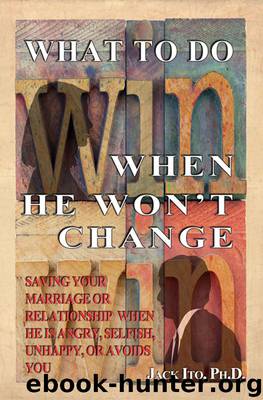What To Do When He Won't Change by Jack Ito

Author:Jack Ito [Ito, Jack]
Language: eng
Format: mobi
Published: 2012-01-28T16:00:00+00:00
Differentiate Anger from Abuse
This chapter is about anger, it is not about abuse (see Chapter 7, Reducing the Risk of Violence). Although anger and abuse often occur together (especially with physical abuse), they also occur separately. This alone is enough to tell us two things: 1) abuse can occur without anger; and 2) anger can occur without abuse. Physical or emotional abuse has to do with intent to harm, whether or not harm actually results, and whether or not the person doing the abuse regrets his actions. So, if I accidentally trip you and you are injured, it is not abuse. But, if I intentionally trip you, meaning for you to be harmed, it is abuse whether you are harmed or not. Whether or not you are physically harmed should not be your line for differentiating abuse. Treat any attempt to harm you as abuse. You should have zero tolerance for abuse.
Although the physically abusive partner is dealt with elsewhere in this book, let me give you just a few guidelines for emotional abuse in case you run into these issues with your angry husband. These issues are common for my clients who have angry husbands.
First, angry people are often (though not always) loud. Being loud in itself is not abuse. Nobody likes getting yelled at, but someone shouting they love you is different from someone shouting they hate you. What is shouted makes the difference. Even whispered words can be abusive. It may hurt to hear “I hate you,” whether it is shouted or whispered, but it is much better than a punch in the nose and is often the start of open communication. Many more couples hurt each other with silence than they do with words. Degrading comments about you, though, are abusive. “You are an *@#&&%!” is certainly abusive. Anything said to you that indicates you are some kind of objectionable object or worse than some objectionable thing, is abuse. “You are worse than a *@#&&%,” for example, is abuse. Likewise, any threat to physically harm you is abuse—whether or not you are physically hurt. And if your husband raises his hand in a way indicating that he will strike you, he has already abused you.
The reason I make these distinctions is not for legal purposes. Legal definitions of abuse differ by culture and jurisdiction. I make the distinction here only so that you know when to deal with anger, and when to deal with abuse—the interventions are different. Any abuse that is happening must be dealt with first. The order of intervention for dealing with abusive husbands is: 1) keep yourself safe; 2) require an appropriate level of treatment; 3) require trust to be rebuilt; and 4) set specific consequences for what will happen if the abuse reoccurs. All of this is easier said than done, and as you read in Chapter 7 (Reducing the Risk of Violence), is best done with professional help.
Download
This site does not store any files on its server. We only index and link to content provided by other sites. Please contact the content providers to delete copyright contents if any and email us, we'll remove relevant links or contents immediately.
The 5 Love Languages: The Secret to Love That Lasts by Gary Chapman(9809)
Doing It: Let's Talk About Sex... by Hannah Witton(9279)
Should I Stay or Should I Go? by Ramani Durvasula(7667)
The Road Less Traveled by M. Scott Peck(7601)
The Lost Art of Listening by Michael P. Nichols(7506)
Daring Greatly by Brene Brown(6512)
Beartown by Fredrik Backman(5754)
We Need to Talk by Celeste Headlee(5615)
Men In Love by Nancy Friday(5240)
The Rules Do Not Apply by Ariel Levy(4969)
The State of Affairs by Esther Perel(4719)
How To Win Friends and Influence People by Dale Carnegie(4512)
Reflections Of A Man by Mr. Amari Soul(4292)
Pillow Thoughts by Courtney Peppernell(4283)
The Ethical Slut by Janet W. Hardy(4251)
Surrounded by Idiots by Thomas Erikson(4082)
Algedonic by r.h. Sin(4062)
He's Just Not That Into You by Greg Behrendt & Liz Tuccillo(3900)
I Love You But I Don't Trust You by Mira Kirshenbaum(3875)
